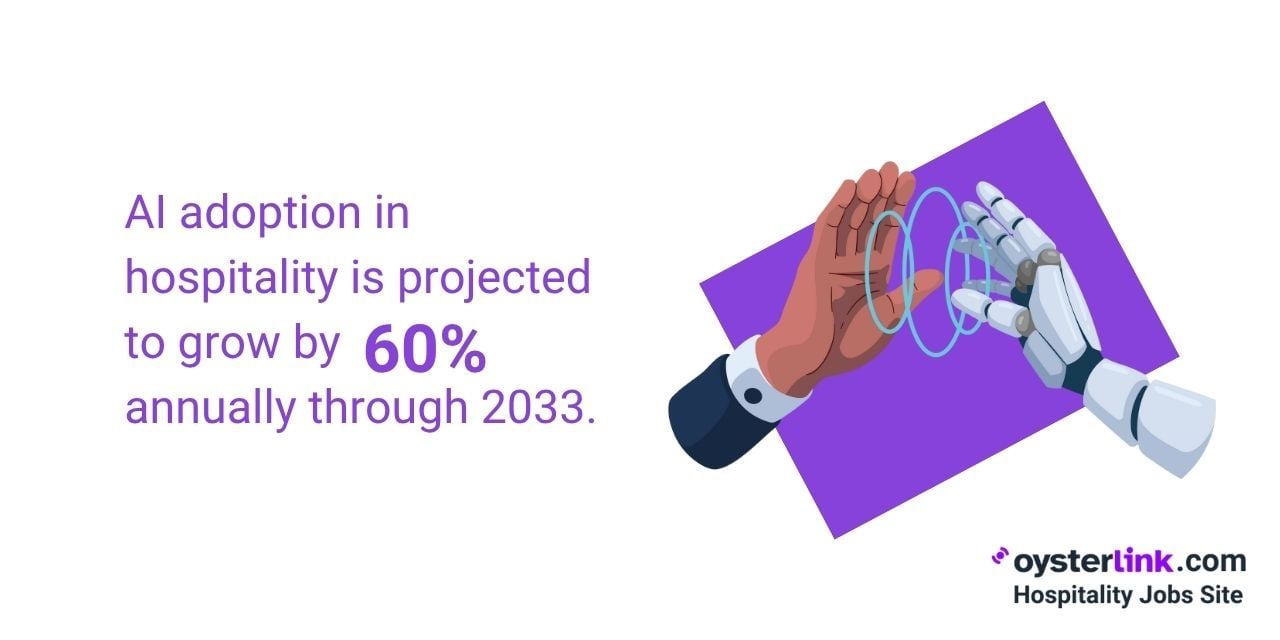Digital Transformation in Hospitality: Key Findings
- 71% of guests are more likely to choose hotels that offer self-service technology, including contactless check-in and digital room keys.
- AI adoption and spending in the hospitality sector is expected to grow 60% annually from 2023 to 2033.
- 69% of hospitality professionals say integrating new tech with legacy systems is their biggest challenge.
Digital transformation in hospitality is no longer optional. From mobile check-ins to AI-powered guest personalization, the industry is rapidly adapting to meet rising customer expectations and operational demands.
This article explores the key stats, trends and innovations defining digital transformation in hospitality this year.
What Is Digital Transformation in Hospitality?
Digital transformation in hospitality is the strategic use of digital technologies to fundamentally change how hotels, resorts and other hospitality businesses operate, engage guests and deliver services.
It’s not just about adding new tools — it’s about redesigning workflows, retraining staff and rethinking service models to meet evolving guest expectations.
In fact, 57% of hotels report revenue growth after implementing digital improvements, underscoring its value beyond guest convenience.
Why Does Digital Transformation in Hospitality Matter?
Digital transformation is essential for modernizing hotel operations and improving guest satisfaction. It allows properties to automate tasks, streamline workflows and reduce reliance on outdated systems.
With tools like mobile check-in, AI chatbots and smart room controls, hotels can deliver faster and more personalized service. It also helps businesses scale without proportionally increasing costs.
As guest expectations evolve, digital transformation ensures hotels remain competitive and relevant.
Top Digital Transformation Trends in Hospitality
These trends highlight how the industry is using digital solutions to improve service, boost efficiency and deliver more personalized experiences.
Mobile-First and Contactless Experiences
Guests expect the convenience of managing their stay entirely from their mobile devices with minimal in-person interaction — from booking to check-out.
Features like mobile key access, real-time messaging, automated check-in/out processes and digital feedback forms are now standard.
According to Oracle Hospitality and Skift Research, 71% of guests are more likely to choose hotels that offer self-service tech, including contactless check-in and digital room keys.
These tools reduce wait times and physical contact — enhancing the experience at both luxury and budget properties.
Smart Rooms and IoT Integration
Hotels are upgrading rooms with Internet of Things (IoT) devices like smart thermostats, lighting and motion sensors. These tools adjust to guest behavior, improving both comfort and energy efficiency.
AI, Automation and DAPs in Hotel Operations
AI is playing a growing role in hotel management — from chatbots handling guest inquiries to algorithms that adjust pricing, staffing and promotions. By automating repetitive tasks, AI allows staff to focus on high-touch services.
Reflecting its rising value, AI adoption and spending in hospitality is projected to grow by 60% annually from 2023 to 2033.

Supporting this shift, Digital Adoption Platforms (DAPs) help staff navigate complex systems, reducing training time and user error.
By improving system usage and onboarding, DAPs lead to faster, more consistent service — boosting both efficiency and guest satisfaction.
Challenges in Digital Transformation in Hospitality
Despite strong momentum, the path to transformation isn’t always smooth.
One major challenge is the continued use of legacy systems — old software and equipment that don’t work well with newer technology.
These outdated systems make it difficult to add tools like mobile check-in, digital room keys, or smart room controls.
According to the 2024 Lodging Technology Study by Hospitality Technology, 69% of hospitality professionals say integrating new tech with existing legacy systems is their biggest challenge, often resulting in slow operations and inconsistent guest experiences.
Lack of planning and investment is another barrier.
A report by Hospitality & Catering News found that only 20% of hospitality operators have a dedicated digital transformation budget, while 63% say they haven’t invested enough to make real progress. Fewer than 10% believe their systems are fully integrated, adding to operational inefficiencies and service gaps.
Disconnected systems are also a widespread issue. Many hotels use separate tools for booking, payments and guest services — but these systems often don’t communicate. This fragmentation makes it hard to get a full view of guests or how the business is performing.
According to Deloitte, 45% of hotels say that fragmented technology and data prevent them from achieving a unified view of their customers and operations.
Digital Transformation in Hospitality: Conclusion
Digital transformation is reshaping hospitality from the inside out. The benefits are clear — faster service, smarter operations and more personalized guest experiences — but the process is complex.
Legacy systems, tight budgets and disconnected tools remain challenges. Yet as demand for mobile-first and AI-enhanced services grows, hotels can’t afford to fall behind.
Those that focus on integration, staff training and long-term strategy will be best equipped to meet guest expectations and stay competitive in a digital-first world.









Loading comments...